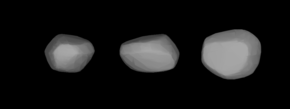417 Suevia
Appearance
 A three-dimensional model of 417 Suevia based on its light curve | |
| Discovery | |
|---|---|
| Discovered by | Max Wolf |
| Discovery date | 6 May 1896 |
| Designations | |
| (417) Suevia | |
| Pronunciation | /ˈswiːviə/[1][2] |
| 1896 CT | |
| Main belt | |
| Orbital characteristics[3] | |
| Epoch 31 July 2016 (JD 2457600.5) | |
| Uncertainty parameter 0 | |
| Observation arc | 119.74 yr (43736 d) |
| Aphelion | 3.17751 AU (475.349 Gm) |
| Perihelion | 2.42031 AU (362.073 Gm) |
| 2.79891 AU (418.711 Gm) | |
| Eccentricity | 0.13527 |
| 4.68 yr (1710.3 d) | |
| 263.971° | |
| 0° 12m 37.746s / day | |
| Inclination | 6.65003° |
| 199.530° | |
| 349.340° | |
| Physical characteristics | |
| Dimensions | 40.69±1.9 km |
| 7.034 h (0.2931 d) | |
| 0.1960±0.020 | |
| KS | |
| 9.34 | |
417 Suevia is a typical Main belt asteroid. It is classified as a K-type/S-type asteroid.
It was discovered by Max Wolf on 6 May 1896 in Heidelberg.
References
[edit]- ^ "Suevian". Oxford English Dictionary (Online ed.). Oxford University Press. (Subscription or participating institution membership required.)
- ^ 'Suivius' in Noah Webster (1884) A Practical Dictionary of the English Language
- ^ "417 Suevia (1896 CT)". JPL Small-Body Database. NASA/Jet Propulsion Laboratory. Retrieved 10 May 2016.
External links
[edit]- 417 Suevia at AstDyS-2, Asteroids—Dynamic Site
- 417 Suevia at the JPL Small-Body Database
